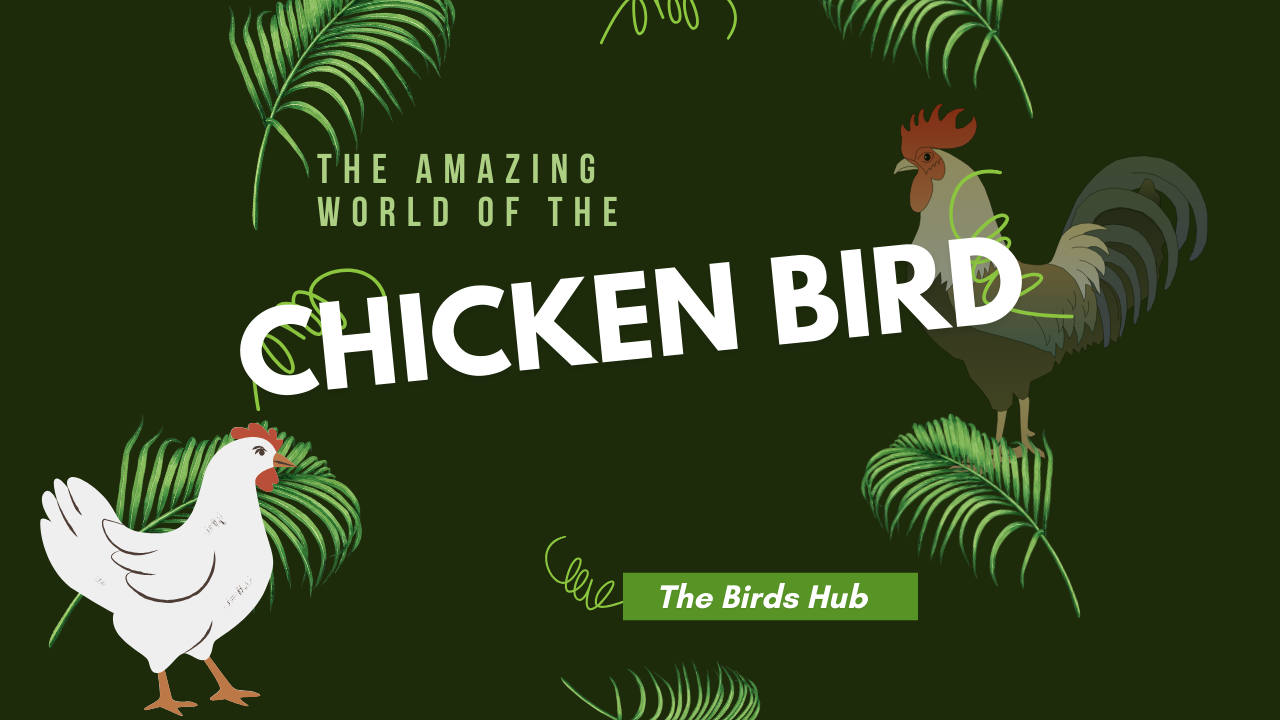The chicken bird might seem like just another farm animal, but it’s got its own story. From its wild beginnings to its central role in cuisines around the world, the chicken bird has clucked its way into our hearts and stomachs. Whether you’re curious about its history, interested in raising your own flock, or you’re just a foodie looking for the next delicious recipe, we got you covered. Now spread your wings and dive into the world of the chicken bird.
Discover the best Finches Birds Delightful Birds

The Origins of the Chicken Bird
Wild Beginnings
Long before the chicken bird became a staple in backyard coops and dinners, it roamed wild and free. Originating from the jungles of Southeast Asia, the ancestor of our modern today’s chicken is the red junglefowl. These colorful birds still live in the forests.
Domestication and Migration
The journey from wild junglefowl to the chicken bird known today began around 80 centuries ago. Early humans noticed these birds were not only good for meat but also for their eggs. So, they turned these wild creatures into domesticated chickens (that now populate farms and backyards worldwide) through selective breeding.
The Chicken’s Ancient Relatives
Did you know that chickens are related to the mighty Tyrannosaurus Rex? That’s right! Genetic studies have shown that chicken birds share some of their DNA with the king of dinosaurs. Imagine that next time you enjoy a roasted chicken.
Raising the Chicken Bird:
Getting Started
If you’re thinking about raising your own flock of chicken birds,you need to know that how to get you started:
Choose Your Breed: There are dozens of chicken breeds, each with their own unique characteristics. Are you looking for lots of eggs, meat, or maybe a friendly pet? Breeds like the Rhode Island Red are great for eggs, while Cornish Cross chickens are popular for meat.
Set Up Your Coop: Chickens need a safe place to roost at night and lay eggs. A well-ventilated coop with nesting boxes and perches is essential. Also make it predator proof.
Feeding The Flock: Although chickens aren’t picky eaters, they do need a balanced diet. A mix of grains, protein, and fresh greens will keep them healthy and happy. And, they love treats like mealworms or kitchen scraps!
Health and Maintenance: Don’t forget to regularly check your chickens for signs of illness, clean the coop weekly and provide fresh water daily. Vaccinations and deworming can help prevent common diseases.
Benefits of Raising Chickens
Raising chickens isn’t just about fresh eggs and meat; it’s considered a whole lifestyle. Here are some of its perks:
Fresh Eggs Daily: Nothing beats the taste of a fresh chicken egg right from the coop.
Pest Control: Chickens love to eat bugs, cleaning pests from your garden.
Fertilizer: Chicken waste is a fantastic natural fertilizer for your plants.
Companionship: Chickens can be surprisingly affectionate and entertaining pets.
Chicken Birds in Culture and Cuisine
Historical Significance
The chicken birds have played a significant role in human history. In ancient Rome, chickens were used for divination, because their behavior was believed to predict the future. In many cultures, chickens are considered symbols of fertility and prosperity.
Global Cuisine
From fried chicken in the American South to chicken tikka masala in Pakistan, the chicken bird is a culinary superstar. Here are some mouth-watering dishes from around the globe:
Coq au Vin (France): A flavorful dish where chicken is braised with wine, mushrooms, and bacon.
Yakitori (Japan): Skewered chicken grilled to perfection, served with a sweet soy glaze.
Pollo a la Brasa (Peru): Rotisserie chicken marinated in a mix of spices and herbs, cooked until the skin becomes crispy and golden.
Butter Chicken (India): Tender pieces of chicken cooked in a buttery, spiced tomato sauce.
Fun Fact: World’s Largest Chicken Nugget
In 2022, a group of chefs in Chicago set the world record for the largest chicken nugget, weighing 46 pounds.
The future of chicken birds
Sustainable Farming
As the demand for poultry continues to grow, sustainable farming practices are more important than ever. Free-range and organic farming methods are gaining popularity nowadays, focusing on the welfare of the chickens and the environment. These practices ensure that the chicken bird continues to thrive while providing us with delicious food.
Innovations in Chicken Care
Technology has also been playing a role in the future of chicken farming. From automated feeding systems to apps that monitor the health of your flock, there are many innovations aimed to make chicken care easier and more efficient.
Conclusion
The world of the chicken bird is full of fascinating facts and rewarding experiences. it doesn’t matter if you’re a seasoned poultry keeper or just starting out. From understanding their history and care to enjoy their eggs and meat, chickens have a lot to offer. With the right knowledge and a bit of effort, raising chickens can be a joyful hobby.
FAQs
Q: How long do chickens live?
Chickens live 5-10 years on average, but some can live longer with proper care.
Q: Can chickens fly?
Chickens can’t fly long distances, but they can flutter short distances, enough to get over a fence or up into a tree.
Q: How many eggs does a chicken lay?
A healthy hen can lay about 250-300 eggs per year, depending on its breed and conditions.
Q: Do chickens need a rooster to lay eggs?
No, hens will lay eggs without a rooster, but those eggs won’t be fertilized (no baby chicks).
Q: What do chickens eat?
Chickens are omnivores and enjoy a varied diet of grains, insects, greens, and kitchen scraps.
Q: What’s the best breed of chicken for beginners?
Some of the best breeds for beginners include Rhode Island Reds, Buff Orpingtons, and Plymouth Rocks. They’re hardy, friendly, and excellent layers.
Q: How do I know if my chicken is sick?
Look out for signs like lethargy, loss of appetite, abnormal droppings, coughing, sneezing, and changes in egg production. Regular health checks can help catch illnesses early.
Q: Can chickens recognize their owners?
Chickens can recognize up to 100 different faces and often form bonds with their owners, showing affection in their own unique ways.
Q: How much space do chickens need?
Each chicken needs about 3-4 square feet of coop space and at least 8-10 square feet of outdoor run space. More space is always better to keep them happy and healthy.
Q: What do I do if my chicken stops laying eggs?
Chickens may stop laying eggs due to stress, poor diet, age, or illness. Ensure they have a balanced diet, a stress-free environment, and check for signs of disease or parasites.
Q: Can I keep chickens in the city?
Many cities allow backyard chickens, but regulations vary. Check your local ordinances for rules on flock size, coop requirements, and noise restrictions.
Q: How can I keep predators away from my chickens?
Secure your coop with sturdy wire mesh, bury fencing at least a foot underground, and use locks on coop doors. Motion-activated lights and guardian animals like dogs can also help deter predators.
Q: Are chickens noisy?
Hens are generally quiet, making soft clucking sounds, especially when laying eggs. Roosters, on the other hand, can be quite loud with their crowing, which might not be ideal in residential areas.
Q: What’s molting, and how should I care for my chickens during this time?
Molting is the process where chickens shed old feathers and grow new ones. It usually happens annually and can take several weeks. During molting, provide extra protein in their diet to support feather growth and avoid stressing the birds.
Q: How can I introduce new chickens to my existing flock?
Introduce new chickens gradually by keeping them in a separate enclosure within sight of the existing flock. After a week or two, allow supervised interaction before fully integrating them. This helps reduce pecking order disputes.
Q: Can chickens stay outside during winter?
Chickens can handle cold weather if they have a draft-free, insulated coop and access to fresh water. Provide extra bedding and consider using a heated waterer to prevent freezing. However, ensure they are protected from extreme cold and drafts.
Q: What’s a dust bath, and why do chickens need it?
A dust bath is a mixture of sand, dirt, and sometimes diatomaceous earth where chickens roll around to clean themselves and control parasites. It’s a natural behavior that helps keep their feathers in top condition.
Q: Do chickens need a special diet?
Chickens require a balanced diet with the right mix of protein, grains, vitamins, and minerals. Layer feed is suitable for egg-laying hens, while chicks need starter feed with higher protein. Supplements like oyster shells provide extra calcium for strong eggshells.
Q: How often should I clean my chicken coop?
It’s good practice to clean the coop weekly, removing droppings and old bedding. A thorough cleaning and disinfecting should be done every few months to prevent disease and parasites.
Q: Can chickens swim?
Chickens aren’t natural swimmers like ducks, but they can paddle in shallow water if necessary. However, it’s best to keep them away from deep water to avoid accidents.
Q: How do chickens communicate with each other?
A: Chickens use a variety of sounds and body language to communicate. They cluck, crow, squawk, and make purring noises to express contentment, alarm, or attract attention. Their body language, such as feather ruffling and pecking, also conveys social status and emotions.
Q: What’s the difference between a broiler and a layer?
Broilers are chickens raised specifically for meat production. They grow rapidly and are usually ready for processing at 6-8 weeks. Layers, on the other hand, are bred for egg production and can lay eggs for several years.
Q: Can chickens and other pets coexist?
Chickens can coexist with other pets like dogs and cats, but introductions should be done carefully. Ensure that pets are supervised and trained to avoid harming the chickens. Some pets, especially dogs with a high prey drive, may not be suitable companions for chickens.
Q: How can I tell the difference between a hen and a rooster?
Roosters typically have larger combs and wattles, more vibrant plumage, and spurs on their legs. They also tend to be larger and may exhibit more aggressive or dominant behavior compared to hens.

